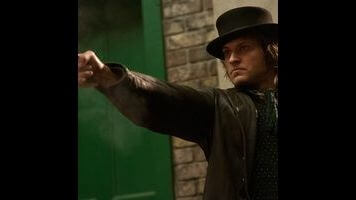Copper: “A Vast And Fiendish Plot”

After the charged conclusion of “A Day To Give Thanks,” which in many ways felt like a season finale — providing satisfying answers to long-running questions but sparking new ones to maintain interest until the show returns — with the emotional line wrapped and the mystery of Corky’s missing wife solved, this episode simply had to fulfill the task of giving some closure to the story of the Confederate conspiracy to burn New York City and the ascension of Morehouse as the hero who will put a stop to it. The show fulfills this goal well enough from a narrative perspective, with a few genuinely shocking twists and turns, but without a central personal story to anchor the action, “A Vast And Fiendish Plot” simply didn’t possess the same sense of complexity and momentum that the episodes leading up to it did.
The episode picks up exactly where the last one left off: a tense, ambiguous moment between Ellen and Corcoran as he begins to process the truth of his daughter’s death and his wife’s betrayal. Suddenly, an urgent knock sounds at the door. We now learn it is Morehouse, come to tell Corky about the rebels’ second, more sophisticated attempt to burn New York with Greek Fire. Morehouse must really take this situation seriously if he is asking for support rather than trying to handle things himself, and Corky is all too happy for an escape from his domestic nightmare. The Greek Fire delivery they bust, however, ends up being a ruse to throw the coppers off the trail. They are able to unravel the details of Kennedy’s true plans just in time to quash them, in part because Corky is willing to work with Maguire after grudgingly acknowledging his value as a detective, if not as a friend.
In addition to having an engaging, emotional trajectory for the show’s protagonist, the last few episodes saw vast improvements in the approach to structure. The flow between the multiple plotlines began to make better sense as the characters became more entangled in one another. The exception being Freeman, who seems to be all alone up there in Carmansville. Perhaps this is realistic given race relations at the time, but he used to be a vital member of Corcoran’s posse, and in episodes like this one where people come together out of old loyalties more than out of recent events, looping Freeman back in would have been a smart and believable move. The larger problem is that many other stories, like Freeman’s does, come in and out infrequently, sometimes arbitrarily, and start to feel like disparate vignettes rather than a connected story. Even scenes that feature Elizabeth, or the odd trio of Ellen, Annie, and Eva on the home front — characters whom should by no means feel removed from the core plot — can have a “Meanwhile, back at the ranch” feeling.
The dialogue however, one of the show’s other persistent weaknesses, was consistently better in “A Vast and Fiendish Plot.” Perhaps it is simply the fact that Corcoran’s tiresome self-seriousness and more conventional hero mythology was not particularly inspiring to the talents of writers Kyle Bradstreet (The Philanthropist, Manhunt) and Kevin Deiboldt (The Borgias, Ed), who create much better material for straight shooter Eva and dry, wry Robert Morehouse. For example, when Corcoran asks Eva to look after his wife for a second time (last week I described him as having balls of steel—those suckers have just been upgraded to platinum), the exchange is both snappy and evocative:
 Keep scrolling for more great stories.
Keep scrolling for more great stories.
